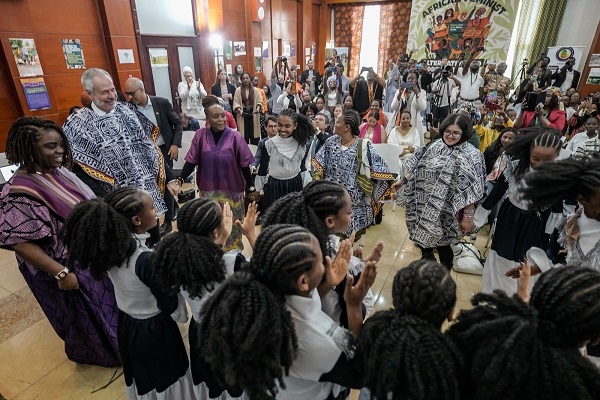 In the bustling corridors of Africa Climate Week in Addis Ababa, there’s no shortage of stories revealing how the climate crisis impacts women’s daily lives. While leaders negotiate global mitigation and adaptation strategies, millions of African women continue to spend hours every day on basic tasks—fetching water, gathering firewood—that are becoming increasingly arduous in the face of environmental degradation.
In the bustling corridors of Africa Climate Week in Addis Ababa, there’s no shortage of stories revealing how the climate crisis impacts women’s daily lives. While leaders negotiate global mitigation and adaptation strategies, millions of African women continue to spend hours every day on basic tasks—fetching water, gathering firewood—that are becoming increasingly arduous in the face of environmental degradation.
It was in this context that Gender Day gained prominence at the conference, highlighting African women’s leadership and the urgency of including feminist demands in the final declaration of the Africa Climate Summit and in the direction of COP30 in Belém. The message was clear: there is no climate justice without gender justice.
The Invisible Burden
In sub-Saharan African countries, data from the Women’s International Environment Programme (WEP) shows that women and girls dedicate a large portion of their day to collecting water. This effort takes time away from education, paid work, entrepreneurship, and political participation. Inequality is exacerbated because, on average, women spend up to five times more hours than men on unpaid domestic activities.
Energy exclusion further widens the gap. Around 600 million Africans still live without electricity—and the burden falls heavily on them. Many cook with wood or charcoal on rudimentary stoves indoors, facing toxic fumes that cause severe respiratory illnesses. The time spent collecting wood is another barrier to access to education and the job market.
Impacts and Resilience
Africa accounts for less than 4% of global emissions but suffers disproportionately from prolonged droughts, water scarcity, forest degradation, and food insecurity. In these crises, women, guardians of natural resources and community life, are on the front lines—facing the risk of violence, lack of basic care, and denied opportunities.
Yet, they are the ones offering pathways: regenerative agriculture practices, solar energy projects, forest conservation. Combating the climate crisis, when led by women, also becomes an opportunity for empowerment.
The Financing Knot
Studies indicate that Africa needs US$250 billion annually for adaptation and mitigation, but receives only a fraction of that amount. While the global commitment of US$100 billion is still lagging, access to resources is especially difficult for grassroots organizations led by women.
Doris Mpoumou, UN Women’s Special Representative to the African Union, summarized the challenge: “It is essential to ensure that financing mechanisms are accessible and truly meet the needs of communities.”
Photo shows Ana Toni, Executive Director of COP30 and National Secretary for Climate Change at the Brazilian Ministry of Environment and Climate Change, and African women.
African female protagonism points the way to climate justice and equality – Photo: Rafa Neddermeyer/COP30 Brasil Amazônia/PR
Female underrepresentation
Inequality is also reflected in global negotiations. Data from the Gender and Environment Data Alliance shows that, at COP29, only 32% of African delegates were women. In 53 of the continent’s 54 delegations, men were the majority. And only four countries publish sex-disaggregated statistics on mortality linked to pollution and natural disasters.
Priscilla Achakapa, president of the WEP, noted that, despite the lack of resources, African women are already implementing innovative solutions—from aquaponics to clean energy. “African women must be present in the negotiations not only as advisory voices, but as leaders in policymaking,” she argued.
COP30: A Chance to Change the Game
With COP30 in Belém, a turning point is expected. Ambassador André Corrêa do Lago acknowledged that the gender agenda entered the climate debates late, but emphasized that it will now be a cross-cutting issue in all negotiations.
Ana Toni, CEO of COP30, reinforced the historic nature of the interaction between African and Black Brazilian women: “This collaboration inspires concrete actions. COP30 must be people-centered, especially women, who are on the front lines of vulnerability, but also of change.”
The consensus among African leaders is crystal clear: Africa doesn’t just want to react to the climate crisis—it wants to lead the global debate and prove that development and equality can go hand in hand.



